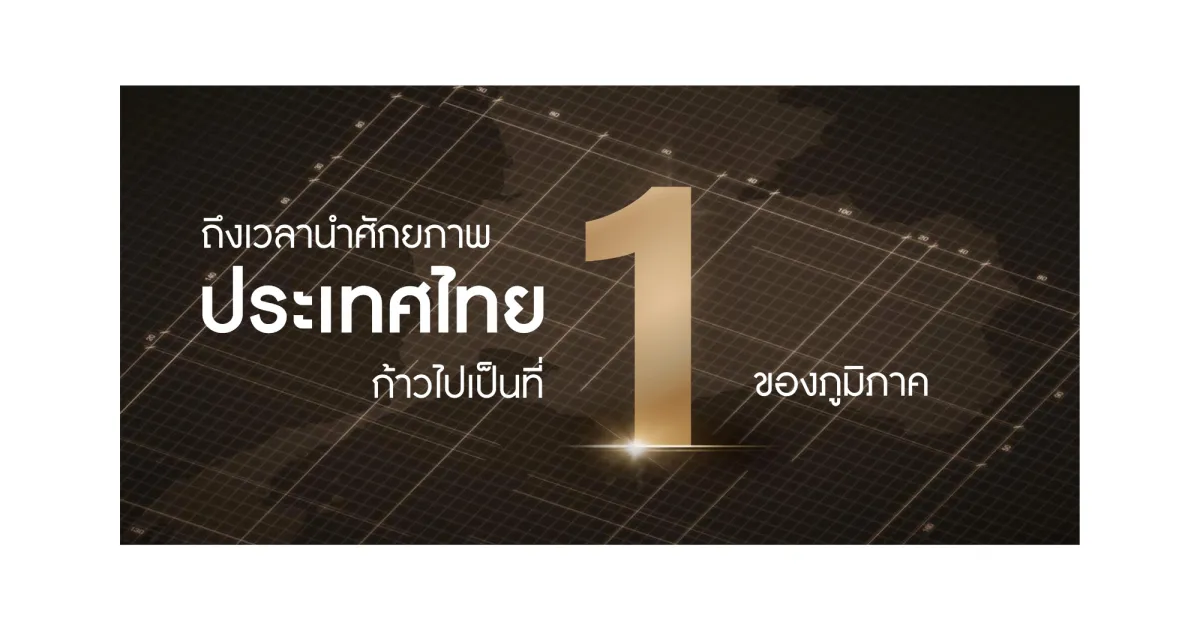
วันนี้ 22 กุมภาพันธ์ 2567 เวลา 09.00 น. ณ ตึกสันติไมตรี (หลังนอก) ทำเนียบรัฐบาล นายเศรษฐา ทวีสิน นายกรัฐมนตรีและรัฐมนตรีว่าการกระทรวงการคลัง ได้ประกาศวิสัยทัศน์ Thailand Vision “IGNITE THAILAND : จุดพลัง รวมใจ ไทยต้องเป็นหนึ่ง” มุ่งเป้าพัฒนาประเทศไทยให้กลายเป็นศูนย์กลางเมืองแห่งอุตสาหกรรมระดับโลก ขับเคลื่อนเศรษฐกิจไทยสู่อนาคตที่ยั่งยืน ครอบคลุมทั้งการท่องเที่ยว การรักษาพยาบาลและสุขภาพ อาหาร การบิน การผลิตยานยนต์แห่งอนาคต เทคโนโลยี และการเงิน
นายกฯ เศรษฐา ทวีสิน เปิดเผยว่า รัฐบาลตั้งเป้าประเทศไทยจะก้าวไปเป็นที่ 1 ของภูมิภาค ด้วยข้อได้เปรียบของประเทศไทย ทั้งด้านทรัพยากรธรรมชาติ สถานที่ท่องเที่ยว ภูมิอากาศที่อบอุ่นตลอดปี โครงสร้างที่พร้อมต่อยอด และที่สำคัญ คือ ศักยภาพของคนไทย
โดยวิสัยทัศน์แรก นายกฯ เศรษฐา ประกาศตั้งเป้าให้ไทยเป็นศูนย์กลางเมืองท่องเที่ยว (Tourism Hub) เนื่องจากประเทศไทยมีขนาดพื้นที่เป็นอันดับที่ 50 ของโลก แต่มีนักท่องเที่ยวเดินทางมาเยือนอยู่ในอันดับที่ 8 ของโลก และอุตสาหกรรมท่องเที่ยวสร้างรายได้ให้กับคนไทยกว่า 1 ใน 3 ของจำนวนประชากร เนื่องจากรายได้หลักของคนไทยมาจากการท่องเที่ยว คิดเป็นมูลค่าทางเศรษฐกิจกว่า 2.3 ล้านล้านบาท หรือคิดเป็น 70% ของงบประมาณรายจ่ายประจำปี เฟ้นหา Soft Power ชูจุดขายเป็นเสน่ห์ของประเทศไทย ให้โดดเด่นในสายตาประชาคมโลก ทั้งในด้านศิลปวัฒนธรรม งานเทศกาล คอนเสิร์ต งานภาพยนตร์ งานศิลปะ อาหาร วัฒนธรรม และที่น่าจับตามองคือ กีฬา และศิลปะป้องกันตัว ซึ่งเป็นอัตลักษณ์ของคนไทย รวมถึงจะผลักดันบางจังหวัดให้เป็นมรดกโลก อย่าง จังหวัดน่าน และรัฐบาลจะเปิดอิสรภาพสู่การเดินทางระดับภูมิภาค อำนวยความสะดวกให้กับนักท่องเที่ยว ปลดล็อกทุกข้อจำกัด ข้อกังวลของการท่องเที่ยว ผ่านการเปิดฟรีวีซ่าให้กับนักท่องเที่ยวในหลายประเทศ อย่าง จีน คาซัคสถาน อินเดีย และไต้หวันให้ประเทศไทยกลายเป็นศูนย์กลางการเดินทางในภูมิภาค และใน CLMV ประกอบไปด้วย กัมพูชา สปป.ลาว เมียนมา และเวียดนาม และหลังจากนี้การท่องเที่ยวในประเทศไทยจะต้องได้รับการส่งเสริมต่อยอดทุกรูปแบบ ทุกจังหวัด ทั้งเมืองหลัก เมืองรองต้องพัฒนาจนกลายเป็นแหล่งท่องเที่ยว พร้อมทั้งแก้ไขกฎ ระเบียบ ที่เป็นอุปสรรคการท่องเที่ยว เช่น เวลาเปิดปิดของสถานบริการ การขายเครื่องดื่มแอลกอฮอล์ รวมถึงการแก้ไขภาษีสำหรับการจัดงานหรือแข่งขันต่าง ๆ รองรับการเป็น Homestay ของคนทั่วโลก โดยในแต่ละหน่วยงานของทุกพื้นที่จะต้องนำธรรมชาติ ประวัติศาสตร์ วัฒนธรรม และวิถีชีวิต สร้างเป็นจุดขาย และ อีกทั้งรัฐบาลปลดล็อกกฎระเบียบต่าง ๆ เอื้อให้ผู้จัดงานระดับโลก ให้สามารถเข้ามาจัดแสดงในประเทศไทย ไม่ว่าจะเป็นคอนเสิร์ต ภาพยนตร์ และงานศิลปะ เป็นต้น ทั้งหมดนี้จะทำให้ทุกภาคส่วนทั้งโรงแรมชั้นนำ ที่พักของคนไทย ร้านอาหาร สินค้าพื้นบ้าน ของดีของเด่นประจำเมือง ตลอดจนสินค้าการเกษตรมีรายได้ที่เพิ่มขึ้น
วิสัยทัศน์ที่ 2 ศูนย์กลางด้านการแพทย์และสุขภาพ (Wellness & Medical Hub) รัฐบาลจะผลักดันอุตสาหกรรมสาธารณสุข ให้เป็นศูนย์ดูแลสุขภาพครบวงจรของโลก ด้วยเพราะระบบการรักษาพยาบาลของประเทศไทยมีชื่อเสียงระดับโลก ทั้งศาสตร์การดูแลสุขภาพแผนไทยที่มีชื่อเสียง บุคลากรที่มีคุณภาพและ Service Mind ทั้งยังสามารถดูแลได้ครอบคลุมตั้งแต่เกิดไปจนถึงวัยชรา และรักษาได้ทุกโรค ที่สำคัญมีค่าใช้จ่ายที่สมเหตุสมผล จนกลายเป็นอีกจุดขายดึงดูดให้นักท่องเที่ยวเดินทางมาเมืองไทยเป็นจำนวนมาก จากข้อมูลในปี 2566 พบว่า การท่องเที่ยวเพื่อสุขภาพ สร้างเม็ดเงินได้กว่า 4 หมื่นล้านบาท นอกจากนี้รัฐบาลจะเดินหน้าพัฒนาระบบประกันสุขภาพของคนไทย จาก 30 บาทรักษาทุกโรค ยกระดับไปเป็น 30 บาทรักษาทุกที่ ซึ่งในส่วนนี้จะทำให้คนไทยเข้าถึงระบบรักษาพยาบาลที่ดีขึ้นทั้งในโรงพยาบาลรัฐบาลและเอกชน ใช้ AI เชื่อมฐานข้อมูลทั้ง 77 จังหวัดด้วยบัตรประชาชนเพียงใบเดียว ซึ่งในขณะนี้นำร่องไปแล้ว 4 จังหวัด และคาดว่าจะครบทุกจังหวัดในสิ้นปีนี้ นอกจากนี้รัฐบาลจะเพิ่มจำนวนหมอ และพยาบาลให้เพียงพอต่อความต้องการของประชาชน พร้อมทั้งจะพัฒนาคุณภาพ ยกระดับชีวิตบุคลากรให้ดีกว่าเดิม และจะผลักดันการแพทย์แผนไทย นวดแผนไทย สปาแผนไทย สมุนไพร รวมทั้งจะสนับสนุนผู้ประกอบการไทย ทำใบรับรองประกาศนียบัตร และผลักดันให้ไปเปิดศูนย์ Wellness Center ได้ในต่างประเทศ
วิสัยทัศน์ที่ 3 ศูนย์กลางอาหาร (Agriculture & Food Hub) รัฐบาลจะยกระดับการผลิตอุตสาหกรรมการเกษตร ทำให้ประเทศไทยอุดมสมบูรณ์ “ในน้ำมีปลา ในนามีข้าว ในกระเป๋าต้องมีเงิน” ดูแลความมั่นคงทางอาหารของโลก พร้อมเป็นครัวของโลกที่สามารถปรุงอาหารทุกประเภทส่งออกไปยังตลาดโลก ด้วยเพราะประเทศไทยมีจุดแข็งทางด้านภูมิศาสตร์ สภาพภูมิอากาศ มีอุตสาหกรรมที่ครบวงจรตั้งแต่การปลูกพืช การเลี้ยงปศุสัตว์ การประมง การแปรรูป การปรุงอาหาร สูตรอาหาร จึงทำให้ประเทศไทยเป็นที่รู้จักในเรื่องรสชาติที่มีความโดดเด่นอร่อยติดอันดับโลก มีร้านอาหารที่ได้รับตรามิชลินกว่า 196 ร้าน และมีร้านที่ได้รับดาวมิชลินกว่า 35 ร้าน ซึ่งรัฐบาลจะเข้ามายกระดับเกษตรกรรม ส่งเสริมเกษตรกรไทย ให้มีรายได้มากขึ้น 3 เท่าใน 4 ปีของรัฐบาลนี้ ดูแลทั้งดิน น้ำ พันธุ์พืช พันธุ์สัตว์ พันธุ์ปลา ให้อุดมสมบูรณ์ และแหล่งชลประทานจะต้องขยายให้ครอบคลุม 40 ล้านไร่ ดูแลการเพาะปลูก Precision Agriculture การเลี้ยงสัตว์ และดูแลปัญหาเรื่องฝุ่น PM 2.5 ไปพร้อม ๆ กัน สนับสนุนสินค้าเกษตรทั้งประเทศไปสู่ตลาดโลก ผลักดันให้ประเทศไทยเป็นปัจจัยทางด้านอาหารของโลก และข้อมูลจากสำนักงานด้านประชากรขององค์การสหประชาชาติ ยังได้คาดการณ์ว่าในปี 2593 ทั่วโลกจะมีจำนวนประชากรทั้งหมดเกือบ 10,000 ล้านคน ซึ่งมากกว่าในปัจจุบันเกือบ 2,000 ล้านคน เมื่อมีจำนวนประชากรเพิ่มขึ้นก็ย่อมต้องการอาหารมากขึ้นเช่นกัน ซึ่งไทยสามารถผลิตอาหารได้ตั้งแต่ต้นน้ำในภาคเกษตรกรรม จนไปถึงการแปรรูปส่งออกไปยังตลาดโลกได้ โดยรัฐบาลจะพัฒนาอุตสาหกรรมอาหารแห่งอนาคต การวิจัยพัฒนาอาหารโปรตีนสูงจากพืช ตลอดจนการพัฒนาอาหารที่แปลกใหม่ ซึ่งคาดว่าจะเป็นกระแสของตลาดโลกในอนาคต นอกจากนี้รัฐบาลจะยกระดับคุณภาพอาหาร ทั้งอาหาร Halal อาหารสำหรับผู้ป่วย และอาหารชนิดพิเศษอื่น ๆ ตลอดจนรัฐบาลจะสนับสนุนผู้ประกอบการไทยให้ไปเปิดร้านอาหารในต่างประเทศมากขึ้น ทำให้ไทยกลายเป็นปัจจัย 4 ของโลกในด้านอาหาร
วิสัยทัศน์ที่ 4 ศูนย์กลางการบิน (Aviation Hub) เป็นโครงสร้างพื้นฐานที่สำคัญที่จะขับเคลื่อนเศรษฐกิจทั่วโลกให้เชื่อมถึงกัน ด้วยจุดแข็งทางภูมิศาสตร์รายล้อมไปด้วยประชากรกว่า 280 ล้านคน ติดอันดับ 5 ของประชากรโลก และมีสภาพแวดล้อมที่เอื้อต่อการท่องเที่ยว ทำงาน ในทุกระดับ ทุกราคาที่เลือกได้ รัฐบาลมีแผนจะพัฒนาสนามบินให้รองรับการ Transit ของสายการบิน และเตรียมปรับเปลี่ยนเส้นทาง ตารางบินให้เหมาะสม เพื่อเพิ่ม Transit Capacity ให้สูงขึ้น เนื่องจากประเทศไทยมีระยะทางไปยังศูนย์กลางทางเศรษฐกิจได้ทั่วโลกใกล้กว่าประเทศเพื่อนบ้าน มีสนามบิน ทั้งเมืองหลัก เมืองรอง ที่พร้อมเป็น Home-base และปรับปรุงโครงสร้างพื้นฐานเรื่องรันเวย์ อาคารผู้โดยการ คลังสินค้า สร้างระบบขนส่งสินค้าควบคุมอุณหภูมิ (Cold Chain) เพิ่มทรัพยากรบุคคล การตรวจความปลอดภัย เสริมคุณภาพการบริการทุกระดับ เพื่อเตรียมพร้อมจะเป็น Homeland ของสายการบินทั้งไทยและสายการบินนานาชาติ เพียบพร้อมไปด้วยศูนย์ดูแลรักษา ซ่อมบำรุง ที่ใหญ่ที่สุดในภูมิภาค จะทำให้ภาคบริการ ภาคการขนส่ง โรงแรม การท่องเที่ยว อาหาร สินค้าเกษตร เติบโตไปยังตลาดโลก
วิสัยทัศน์ที่ 5 ศูนย์กลางขนส่งของภูมิภาค (Logistic Hub) รัฐบาลจะพัฒนาโครงสร้างพื้นฐาน เพิ่มศักยภาพระบบคมนาคมทั้งในและต่างประเทศ โดยรัฐบาลมีแผนจะเพิ่มโอกาสทางเศรษฐกิจ กระจายความเจริญจากเมืองใหญ่สู่เมืองเล็ก ตั้งแต่การปรับปรุงสนามบินทั้งระบบ ขยายถนนทั้งถนนหลัก ถนนรอง ในปี ซึ่งภายในปี 2593 จะต้องขยายทางหลวง Motorway 10 เท่า จากปัจจุบัน 250 กิโลเมตร ให้เป็นเกือบ 2,500 กิโลเมตร และทางหลวงแผ่นดิน 4 เลน จาก 20,000 กิโลเมตรให้เป็น 23,000 กิโลเมตร เชื่อมต่อตั้งแต่ชายแดนภาคเหนือที่ติดกับเมียนมาร์ สปป.ลาว เชื่อมต่อไปยังชายแดนไทย-มาเลเซีย ส่วนระบบราง จะพัฒนารถไฟรางคู่ เพิ่มระยะทางอีก 2,000 กิโลเมตร ซึ่งจะทำให้ระบบรางระหว่างเมืองมีระยะทางรวม 5,500 กิโลเมตรภายในปี 2573 ในส่วนของระบบรถไฟฟ้าทั้งกรุงเทพฯ และภูมิภาคจะมีระยะทางเพิ่มขึ้น 2.5 เท่า ครอบคลุมเส้นทางเกือบ 700 กิโลเมตร มีรถไฟความเร็วสูง เชื่อมสู่ 3 สนามบินและจะเชื่อมไปยังชายแดนหนองคายพร้อมทั้งเชื่อมต่อไปยังท่าเรือน้ำลึกที่แหลมฉบัง สำหรับส่งสินค้าจากอุตสาหกรรมหนัก อุตสาหกรรมอิเล็กทรอนิกส์ อุตสาหกรรมชิ้นส่วน และอุตสาหกรรมอาหาร เปิดตัวเป็นศูนย์กลางคมนาคมของอาเซียน เชื่อมจีน ยุโรป และเป็นศูนย์กลางขนส่งผ่าน Land Bridge เชื่อมสองฝั่งมหาสมุทรอันดามัน_อ่าวไทย สร้างความสมดุลสู่ความมั่งคั่งเป็นตัวกลางการค้าระหว่างโลกตะวันตกและตะวันออก ซึ่งการลงทุน Mega project ในครั้งนี้ จะเป็นการลงทุนใหญ่ในรอบ 20 ปี นอกจากโครงสร้างพื้นฐาน เราจะต้องปรับปรุงกระบวนการทำงานทั้งหมด (One Stop Service) ไม่ให้ระบบราชการ ระบบเอกสาร เป็นคอขวดของการขนส่งทั้งคน ทั้งสินค้า เป็นภาพลักษณ์ที่ไม่ดีของประเทศโดยเด็ดขาด บริษัทชั้นนำระดับโลก มาตั้งฐานการลงทุนในประเทศไทย และสร้างอาชีพ สร้างโอกาส สร้างรายได้
วิสัยทัศน์ที่ 6 ศูนย์กลางผลิตยานยนต์แห่งอนาคต (Future Mobility Hub) รัฐบาลตั้งเป้าให้ประเทศไทยเป็นศูนย์กลางการผลิตยานยนต์แห่งอนาคต มีเป้าหมายจะได้แผนการลงทุนกว่า 1 ล้านล้านบาท ได้หารือพูดคุยกับบริษัทยานยนต์ไปมากกว่า 10 ราย และมีการตอบรับจะลงทุนในประเทศไทยแล้วมากกว่า 150,000 ล้านบาท เนื่องจากเศรษฐกิจของเราเติบโตแบบก้าวกระโดด เพราะอุตสาหกรรมรถยนต์ โดยเฉพาะค่ายรถยนต์ญี่ปุ่นที่เลือกไทยเป็นบ้านหลังที่ 2 ในวันนี้ที่อุตสาหกรรมกำลังเปลี่ยนผ่านไปสู่รถ EV ประเทศไทยเราก็มีผลตอบรับที่ดี เนื่องจากประเทศไทยมีความพร้อมในทุก Supply Chain มีผู้ผลิตชิ้นส่วน วิศวกร และ Programmer ที่มีศักยภาพ รัฐบาลจึงมีแผนจะส่งเสริมอุตสาหกรรมรถ EV ตลอดห่วงโซ่อุปทาน ตั้งแต่การค้นคว้าวิจัย การผลิตชิ้นส่วน ยางรถยนต์ แบตเตอร์รี่ อะไหล่ การประกอบ การบำรุงรักษา ทำให้เกิดเป็น Ecosystem ที่สมบูรณ์ในประเทศ พร้อมทั้งจะให้การสนับสนุนค่ายรถจากญี่ปุ่น ที่ช่วยสร้างเศรษฐกิจไทย ให้สามารถเปลี่ยนผ่านไปสู่อุตสาหกรรมยายนต์แห่งอนาคตได้ นอกจากนี้ รัฐบาลได้เตรียมพร้อมสำหรับเทคโนโลยีอื่น ๆ อย่างเช่น เครื่องยนต์ Hydrogen เพื่อรองรับอุตสาหกรรมในอนาคต
วิสัยทัศน์ที่ 7 ศูนย์กลางเศรษฐกิจดิจิตอล (Digital Economy Hub) รัฐบาลตั้งเป้าดึงอุตสาหกรรมแห่งอนาคต Digital for all Technology Innovation AI ให้มาขยายธุรกิจในประเทศไทย โดยเฉพาะเทคโนโลยี High Tech ต่าง ๆ ทั้งการลงทุนโรงงานผลิต Semiconductor, การตั้งศูนย์ Data Center รองรับ Cloud Computing, การวิจัยและนำ AI มาใช้งานในประเทศไทย รวมถึงดึงบริษัท Deep Tech ให้เข้ามาอยู่ในประเทศไทยด้วยเช่นกันผ่านโมเดล Sandbox ซึ่งรัฐบาลจะมีเงินสนับสนุนบริษัทที่ต้องการผ่านกองทุน เพื่อเพิ่มความสามารถในการแข่งขัน และจะทำ Matching Fund เติมทุนให้กับบริษัทที่มีศักยภาพด้วย และในขณะเดียวก็เตรียมปรับกระบวนการทางกฎหมายที่เป็นอุปสรรคในการตั้งบริษัท การทำงาน การรับ - จ่ายเงินเดือน การถือครองทรัพย์สินต่าง ๆ เพื่อดึงคนที่มีความสามารถเข้ามาตั้งรกรากในประเทศไทย นอกจากนี้ รัฐบาลจะสนับสนุนให้บริษัทสามารถประกอบธุรกิจข้ามไปยังประเทศเพื่อนบ้านโดยใช้จุดแข็งทางด้านการเป็นศูนย์กลางของภูมิภาค ซึ่งจะทำให้คนรุ่นใหม่ที่อยากจะร่วมงานกับบริษัทชั้นนำในระดับโลก ไม่ต้องย้ายไปอยู่ในต่างประเทศ และจะเป็นโอกาสให้คนไทยที่อยากจะเป็นเจ้าของธุรกิจ Start Up สามารถสร้าง Unicorn ของตนเองต่อไป
และวิสัยทัศน์ที่ 8 ศูนย์กลางทางการเงิน (Financial Hub) รัฐบาลตั้งเป้าจะเปลี่ยนให้ไทยเป็น Financial Center of Southeast Asia ขับเคลื่อนโดยระบบการเงินที่แข็งแกร่ง ดึงสถาบันการเงินระดับโลกเข้ามาลงทุน สร้างย่านการเงิน Wall Street ของอาเซียนให้เกิดขึ้นในประเทศไทย และพัฒนา Infrastructure รองรับระบบการเงินแห่งอนาคตขับเคลื่อนด้วย Blockchain ที่ไร้ตัวกลาง และเตรียมปลดล็อก Digital Asset ต่าง ๆ ให้สามารถแปลงเป็นผลผลิตในโลกแห่งความเป็นจริง รวมถึงเชื่อมต่อระหว่างสินทรัพย์ในโลกปัจจุบันให้มาอยู่บนโลกดิจิทัลได้อีกด้วย นอกจากนี้ รัฐบาลจะเริ่มพัฒนาระบบการเงินเพื่อความยั่งยืน Carbon Credit Trading ซึ่งในอนาคตจะมีความสำคัญมากยิ่งขึ้น ทั้งนี้รัฐบาลจำเป็นต้องมีหน่วยงาน กฎระเบียบ รองรับการก้าวไปสู่ยุคการเงินสมัยใหม่เช่นกัน
ปิดท้ายด้วย พื้นฐานที่จะนำไปสู่ความสำเร็จ (Foundation to Success) นายกฯ เศรษฐา ยังเผยทิ้งท้ายว่า การจะทำทุกอย่างให้สำเร็จได้นั้น มีเป้าหมายอย่างเดียวคงไม่พอ การเป็นศูนย์กลางต่าง ๆ ต้องอาศัยความร่วมมือร่วมใจของประชาชนทุกคน เป้าหมายความเจริญทางเศรษฐกิจ จะต้องมาพร้อมกับการพัฒนาทางสังคมด้วยกระบวนการทำงานต่าง ๆ ของภาครัฐ (Transparency) โครงสร้างพื้นที่ฐานที่จับต้องได้ และทางสังคมจะต้องมีการปรับปรุงด้วย และรัฐบาลจะอัปเกรดระบบงานของรัฐทั้งหมดขึ้นระบบ Cloud เพื่อให้บริการประชาชนได้เร็วยิ่งขึ้น และจะทำระบบ Application SDK มาตรฐานของรัฐ เปิดให้ทั้งภาคประชาชน และเอกชนเข้าใช้งานได้ Digital Wallet เองก็จะเชื่อมโยงกับฐานข้อมูลของรัฐนี้ ซึ่งอาจจะได้เห็น Start Up ใหม่ ๆ เกิดขึ้นจากการใช้บริการจากภาครัฐ และรัฐบาลจะให้ความสำคัญในเรื่องของความเท่าเทียมกัน (Equality) ทั้งเพศสภาพ การประกอบอาชีพ การรักษาพยาบาล รองรับทั้งผู้สูงวัย ผู้พิการ หญิงตั้งครรภ์ และเด็ก วัฒนธรรมที่เปิดกว้าง (Soft Power) พร้อมต่อยอด เปลี่ยนไปตามยุคสมัยได้ โดยไม่ละเลยอัตลักษณ์และตัวตน จนสามารถสร้างรายได้ให้ตนเอง โอกาสทางการศึกษา (Education) ที่จะต้องได้รับการพัฒนา โดยรัฐบาลจะเป็นผู้กำหนดมาตรฐาน เปิดช่องทางการเรียนรู้ใหม่ ๆ สร้างกลไกที่เอื้อให้เอกชนมีส่วนร่วมตั้งแต่การพัฒนา Content การทำ Play-based learning พร้อมทั้งผลักดันเด็กไทยอ่านภาษาอังกฤษ ต่อยอดภาษาต่างประเทศได้ด้วย ไปจนถึงประเทศ ความปลอดภัย (Safe & Security) สังคมต้องปราศจากอาชญากรรม และยาเสพติดทุกรูปแบบ ประชาชนใช้ชีวิตอย่างปลอดภัย และ พลังงานสะอาด (Green Society) ประชาชนและภาคธุรกิจจะต้องเข้าถึงพลังงานสะอาดและราคาถูก